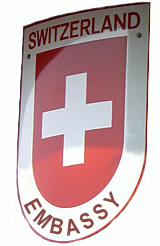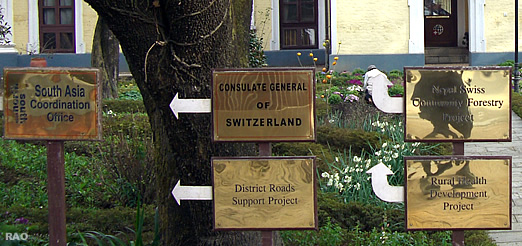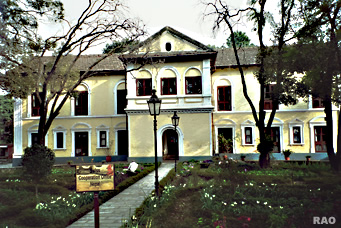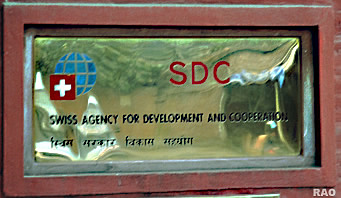| Development
in Nepal: Reports on Tourism |
 |
Nepal Development |
|
|
 |
|
Development
in Nepal: Switzerland in Nepal
|
|
Swiss
Agency for Development and Cooperation (SDC)
|
|
Swiss
Cooperation Strategy for Nepal 2005-2008
|
 |
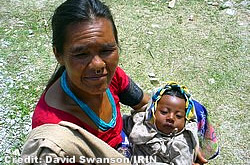 |
The
political power struggle defines life in Nepal. The civil war between the
Royal Nepalese Army and the Maoists cannot be resolved militarily, but
many anticipate that the hostilities are likely to continue for years,
in part because the conflicting parties show no willingness to compromise
or share power.
|
|
The
Nepalese Population suffers from it: democracy is suspended, human rights
are violated, space for development work is reduced, social and economic
developments are at a standstill.
As
a result, Nepal has become a fragile state, in which the achievement of
the Millennium Development Goals (MDGs) and the implementation of the government's
Poverty Reduction Strategy (PRS) are seriously jeopardized.
However,
provided that a sustainable settlement of the conflict is found within
a reasonable time and its root causes are adequately addressed, the present
turmoil might pave the way for a more democratic, inclusive and equitable
society in the future.
As
a longstanding partner in development cooperation with an excellent reputation
in Nepal, Switzerland has competencies and assets to offer to its host
country. Over the last few years, close monitoring of the political and
human rights situation in a very volatile environment has demonstrated
the need and the appropriateness of being prepared and adaptable to work
in either a hostile environment with a humanitarian crisis (Scenario A),
or in an environment where a meaningful dialogue between all relevant stakeholders
is possible (Scenario B) and where development can resume. Based on its
assets and experiences, Switzerland can achieve meaningful results even
as Nepal oscillates between these two extreme scenarios. Indeed, responding
to this uncertain context, SDC and PD IV will employ development cooperation,
humanitarian aid and political peacebuilding instruments.
|
|
SDC office in Ekanta Kuna, Patan
The
Swiss Cooperation Strategy for Nepal 2005-2008 recognizes that staff safety
is of paramount importance. This can best be managed in close cooperation
with other agencies, as the formulation of Basic Operating Guidelines and
regular meetings in times of crisis (e.g. the royal takeover on 1 February
2005) have clearly shown.
Operationally,
a regular field presence of staff that communicates in a transparent manner
with both sides to the conflict and that works through local communities
and NGOs is essential for SDC Nepal to be perceived as a neutral, impartial
and hence acceptable development partner for all. |
|
The
implementation of Conflict Sensitive Programme Management requires that
SDC Nepal and all Swiss-financed projects strictly scrutinize their activities
according to 'Do No Harm / Do Good' criteria.
Development work must contribute
to the alleviation and mitigation of the effects of the conflict, where
the concerns and needs of women and children deserve special attention.
according
to the prevailing scenario, the program must ensure a sound balance between
its long and short term impacts, with palpable and immediate results for
the population in need.
The
costs and benefits of its interventions will be critically monitored, accepting,
however, that approximately 20 percent of time investment/expenditures
is on average needed to operate a program in a situation of open conflict.
In close cooperation with its main partner, Helvetas, SDC Nepal foresees
building on its vast experience of working in rural areas with local communities.
For this reason, activities will be concentrated and focused in some cluster
areas, where the programme has traditionally had substantial presence and
impact.
top
|
The
Swiss Cooperation Strategy Nepal 2005-2008 consists of three main components.
|
 |
Meaningful
Dialogue and Conflict Transformation:
 |
Without
peace, democracy and a respect for human rights, sustainable development
is not possible. Switzerland is committed to contribute to the creation,
from the grassroots right up to the track-one level, of a favourable environment
for reconciliation and peacebuilding that addresses and transforms the
political and social conflicts in the country. The
Swiss Cooperation Strategy for Nepal 2005-2008 is intended to last at least
3 years (mid 2005 - mid 2008). |
|
In the event that the context in Nepal in
2008 is comparable to the one prevailing today, the strategy might be prolonged.
The
total budget per annum will be in the range of CHF 19 million; of which
CHF 13 million will be contributed by the East Asia Division for bilateral
cooperation.
Harmonized
Bi- and Multilateral Framework:
Particularly
in times of conflict, coordination and harmonization among development
partners - including the UN system, the international development banks,
as well as agencies providing humanitarian assistance - are a prerequisite
for effective aid.
Therefore,
Switzerland aims to foster and to deepen a coherent approach and dialogue
between bilateral and multilateral development partners.
Livelihood
and Inclusion (inclusive participation):
Poverty,
especially in rural areas, combined with the systematic exclusion and discrimination
of wide segments of the population due to their gender, caste or ethnic
background, are some of the most prominent catalyzing causes of the Maoist
insurgency.
Therefore,
through the management of natural resources, the building of rural infrastructure,
the provision of health services and the promotion of local democracy,
SDC aims to maintain and improve the living standard in the villages, with
a strong focus on disadvantaged people.
top
| Links |
 |
 |
 |
External
link |
|





